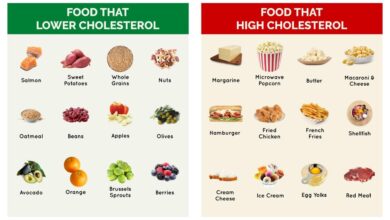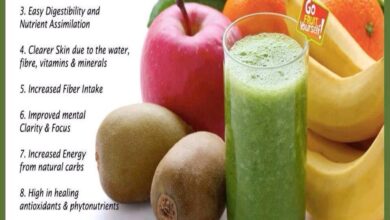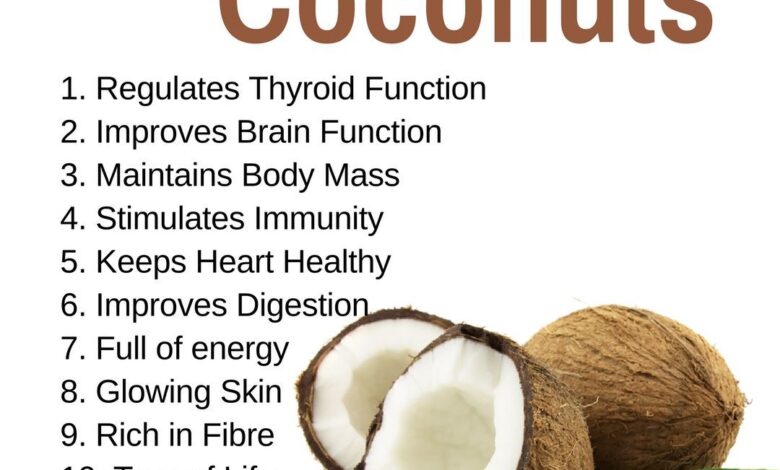
Can Coconut Be Healthy: Exploring Its Benefits and Risks
Can coconut be healthy? This question has become increasingly relevant as coconut products have gained popularity in recent years. From coconut water to coconut oil, this tropical fruit seems to be everywhere, promising a range of health benefits. But is the hype justified?
This blog post delves into the nutritional value, health implications, and versatility of coconut, exploring both its potential advantages and any associated risks.
We’ll examine the macronutrient composition, vitamins, and minerals present in coconut, as well as its fiber content. We’ll also compare the nutritional profiles and benefits of various coconut products, including coconut water, coconut milk, coconut oil, coconut flour, and coconut sugar.
Furthermore, we’ll discuss how coconut fits into different dietary approaches, such as ketogenic, vegan, and vegetarian diets, and explore its potential impact on heart health, skin and hair health, and traditional medicine practices.
Nutritional Value of Coconut
Coconut, a tropical fruit, is a versatile ingredient used in various culinary and medicinal applications. Its nutritional profile is rich in essential nutrients, making it a valuable addition to a balanced diet.
Macronutrient Composition
Coconut is a good source of calories, primarily from fats. It contains a high proportion of saturated fats, mainly lauric acid, which has been linked to various health benefits. However, it is important to note that coconut also contains some unsaturated fats, including monounsaturated and polyunsaturated fats.
Additionally, coconut provides a moderate amount of carbohydrates and a small amount of protein.
Essential Vitamins and Minerals
Coconut is a source of several essential vitamins and minerals, including:
- Vitamin C:An antioxidant that supports immune function and collagen production.
- Vitamin E:Another antioxidant that protects cells from damage caused by free radicals.
- Iron:Essential for red blood cell production and oxygen transport.
- Magnesium:Plays a role in muscle function, nerve transmission, and blood sugar control.
- Manganese:Involved in bone formation, wound healing, and metabolism.
- Phosphorus:Essential for bone health, energy production, and cell signaling.
- Potassium:An electrolyte that helps regulate blood pressure and fluid balance.
- Sodium:Another electrolyte that plays a role in fluid balance and nerve function.
- Zinc:Important for immune function, wound healing, and cell growth.
Fiber Content
Coconut is a good source of dietary fiber, particularly in the form of insoluble fiber. Insoluble fiber adds bulk to stool, promoting regular bowel movements and preventing constipation.
Potential Health Risks
While coconut offers various health benefits, excessive consumption can lead to potential health risks:
- High Saturated Fat Content:Coconut’s high saturated fat content can contribute to increased LDL (“bad”) cholesterol levels, which can increase the risk of heart disease.
- Calorie Density:Coconut is calorie-dense, and consuming too much can lead to weight gain.
- Allergic Reactions:Some individuals may be allergic to coconut, experiencing symptoms such as hives, itching, and difficulty breathing.
Types of Coconut Products
Coconut, a tropical fruit, offers a variety of edible products that are not only delicious but also boast a range of nutritional benefits. These products, including coconut water, coconut milk, coconut oil, coconut flour, and coconut sugar, have become increasingly popular in recent years due to their versatility in cooking and baking, as well as their potential health benefits.
Nutritional Differences and Benefits
| Product Type | Nutritional Value | Benefits | Potential Risks |
|---|---|---|---|
| Coconut Water | Rich in electrolytes, low in calories, and contains vitamins and minerals like potassium, magnesium, and calcium. | Hydrates the body, replenishes electrolytes after exercise, and supports cardiovascular health. | May contain high levels of natural sugars, which could be a concern for individuals with diabetes or those monitoring their sugar intake. |
| Coconut Milk | High in saturated fat, but also a good source of vitamins, minerals, and fiber. | Improves heart health, supports weight management, and provides a creamy texture to dishes. | High in calories and saturated fat, which may contribute to weight gain if consumed in excess. |
| Coconut Oil | Contains medium-chain triglycerides (MCTs), which are easily absorbed and utilized by the body for energy. | Boosts metabolism, improves cognitive function, and supports healthy cholesterol levels. | High in saturated fat, which may increase LDL cholesterol levels if consumed in excess. |
| Coconut Flour | Low in carbohydrates and calories, and a good source of fiber. | Supports weight management, improves digestion, and provides a gluten-free alternative for baking. | May absorb more liquid than traditional flour, requiring adjustments in recipes. |
| Coconut Sugar | Contains a lower glycemic index than refined sugar, and a good source of minerals like iron and zinc. | Provides a natural sweetener with a lower impact on blood sugar levels. | Still a source of sugar and should be consumed in moderation. |
Uses of Coconut Flour and Coconut Sugar
Coconut flour, due to its low carbohydrate and calorie content, is a popular choice for gluten-free baking. It can be used in various recipes, including pancakes, muffins, and even bread. However, it is important to note that coconut flour absorbs more liquid than traditional wheat flour, so recipes need to be adjusted accordingly.
Coconut sugar, derived from the sap of coconut palm trees, is a natural sweetener that has a lower glycemic index than refined sugar. It can be used in place of sugar in a variety of recipes, including desserts, sauces, and even coffee.
Coconut in Different Diets
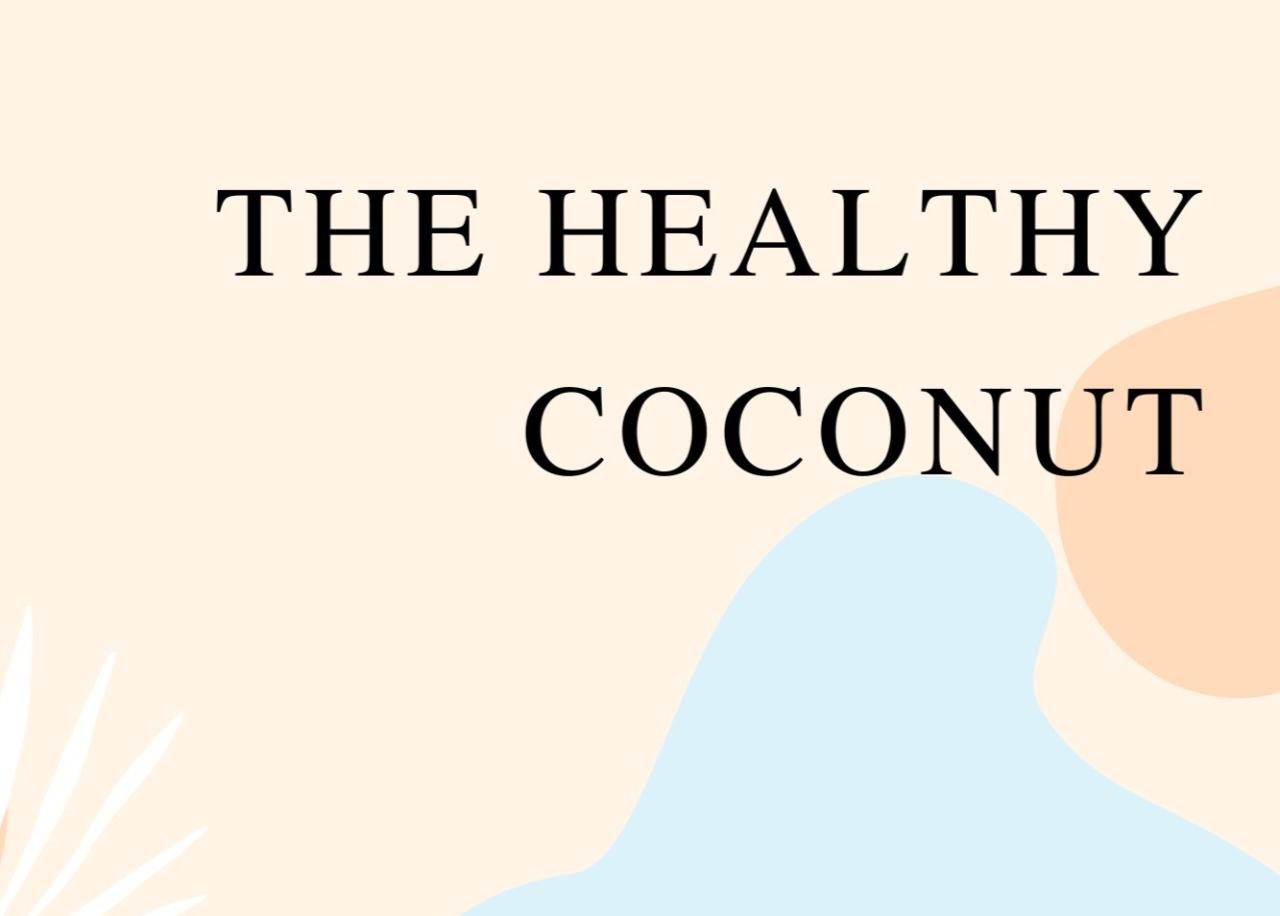
Coconut, with its versatility and unique nutritional profile, has found its place in various dietary approaches. Its high fat content, primarily saturated, makes it a popular choice in ketogenic diets, while its abundance of fiber and other nutrients makes it suitable for vegans and vegetarians.
Understanding how coconut fits into different dietary patterns can help you make informed choices about its inclusion in your own diet.
Coconut in Ketogenic Diets
The ketogenic diet, often referred to as the keto diet, emphasizes a high intake of fat, moderate protein, and very low carbohydrates. Coconut products, particularly coconut oil and coconut milk, align well with this dietary approach due to their high fat content.
You might be surprised to learn that coconut, in its natural form, can actually be a healthy addition to your diet. It’s packed with fiber, healthy fats, and even some vitamins and minerals. But the key is to choose wisely.
A registered dietitian can help you navigate the world of coconut products, like coconut oil, milk, and flour, and determine which ones are best for you. Check out this article on 3 surprising takeaways about being a registered dietitian for a glimpse into the valuable insights they can provide.
Whether you’re looking for ways to incorporate coconut into your diet or just want to learn more about nutrition in general, a registered dietitian is a great resource to have in your corner.
Coconut oil, composed primarily of medium-chain triglycerides (MCTs), is easily digested and utilized by the body for energy. MCTs bypass the liver and are readily converted into ketones, which the body uses as fuel in the absence of glucose.
The ketogenic diet is designed to induce a state of ketosis, where the body primarily uses fat for energy instead of carbohydrates.
Coconut oil, with its high MCT content, can contribute to this metabolic shift and support ketosis. Additionally, coconut milk, despite containing some carbohydrates, is low in net carbs (total carbohydrates minus fiber) and can be incorporated into keto-friendly recipes.
Coconut in Vegan and Vegetarian Diets
Coconut products are naturally vegan, making them a valuable addition to plant-based diets. Coconut milk, coconut cream, and coconut oil are all free from animal products and can be used in various vegan recipes. Coconut flour, derived from dried coconut meat, is a gluten-free alternative to wheat flour and can be used in baking and other culinary applications.
Coconut is a versatile ingredient that can be incorporated into a wide range of vegan and vegetarian dishes.
The abundance of fiber, electrolytes, and other essential nutrients in coconut products can contribute to the nutritional completeness of vegan and vegetarian diets. Coconut milk, for instance, is a good source of potassium, magnesium, and manganese, which are often lacking in plant-based diets.
Coconut and Weight Management, Can coconut be healthy
Coconut has been touted as a potential aid in weight management, but its role in this context is complex and requires further research. Some studies suggest that MCTs in coconut oil can increase satiety and promote fat burning, potentially leading to weight loss.
However, it’s important to note that coconut oil is still high in calories, and excessive consumption can lead to weight gain.
Coconut oil is high in calories, and its impact on weight management is influenced by individual factors and dietary habits.
Moreover, the benefits of coconut for weight management are likely influenced by individual factors, including dietary habits, exercise levels, and overall health. While coconut can be incorporated into a balanced diet, it’s crucial to consume it in moderation and as part of a comprehensive weight management plan.
Potential Interactions of Coconut
While generally considered safe for consumption, coconut can interact with certain medications and medical conditions. Coconut oil, due to its blood-thinning properties, may interact with blood thinners such as warfarin and aspirin. Individuals taking these medications should consult their healthcare provider before consuming significant amounts of coconut oil.
Coconut oil may interact with blood thinners and other medications, so it’s important to consult a healthcare professional if you have any concerns.
Additionally, individuals with thyroid conditions should be cautious with coconut oil, as it contains lauric acid, which may interfere with thyroid hormone production. If you have any pre-existing medical conditions, it’s essential to consult with your doctor before incorporating coconut into your diet.
Coconut is a versatile ingredient, but can it truly be considered healthy? It’s a good source of fiber and healthy fats, but moderation is key. To balance out any potential downsides, it’s essential to focus on getting plenty of vegetables in your diet.
Check out these 5 ways to up your vegetable game for some inspiration. Ultimately, a balanced diet that includes a variety of fruits, vegetables, and whole grains is the best way to ensure you’re getting the nutrients you need, whether you’re enjoying coconut or not.
Coconut and Heart Health
Coconut has gained popularity as a health food, but its impact on heart health is a topic of ongoing debate. While some studies suggest potential benefits, others raise concerns about its high saturated fat content.
Coconut Oil’s Impact on Cholesterol Levels
Coconut oil is rich in saturated fat, primarily lauric acid, which is known to raise LDL (“bad”) cholesterol levels. However, it also increases HDL (“good”) cholesterol, which can be beneficial for heart health. The net effect of coconut oil on cholesterol levels is still under investigation.
Coconut, a tropical fruit, can be a healthy addition to your diet when consumed in moderation. It’s packed with fiber, vitamins, and minerals. But if you’re looking for ways to add some vibrant color to your Thanksgiving table, check out this article on 5 ways to fill your thanksgiving table with color.
While you’re focusing on colorful dishes, remember that coconut can be a tasty and nutritious addition to your Thanksgiving feast, too!
Coconut’s Role in Promoting Cardiovascular Health
Coconut oil contains medium-chain triglycerides (MCTs), which are metabolized differently than long-chain triglycerides found in other fats. MCTs are readily absorbed and used for energy, potentially leading to a decrease in triglyceride levels in the blood. Additionally, coconut oil may have anti-inflammatory properties, which could contribute to cardiovascular health.
Potential Benefits of Coconut for Blood Pressure Regulation
Some studies suggest that coconut oil may help regulate blood pressure. This effect could be attributed to its lauric acid content, which has been shown to have hypotensive effects in animal studies. However, more research is needed to confirm these findings in humans.
Comparison of Heart-Healthy Aspects of Coconut with Other Common Dietary Fats
| Fat Type | Saturated Fat Content | LDL Cholesterol Effect | HDL Cholesterol Effect | Other Heart-Healthy Aspects |
|---|---|---|---|---|
| Coconut Oil | High | Increases | Increases | Rich in MCTs, potential anti-inflammatory properties |
| Olive Oil | Low | Decreases | Increases | Rich in monounsaturated fats, antioxidant properties |
| Avocado Oil | Moderate | Decreases | Increases | Rich in monounsaturated fats, contains heart-healthy potassium |
Coconut and Skin & Hair Health
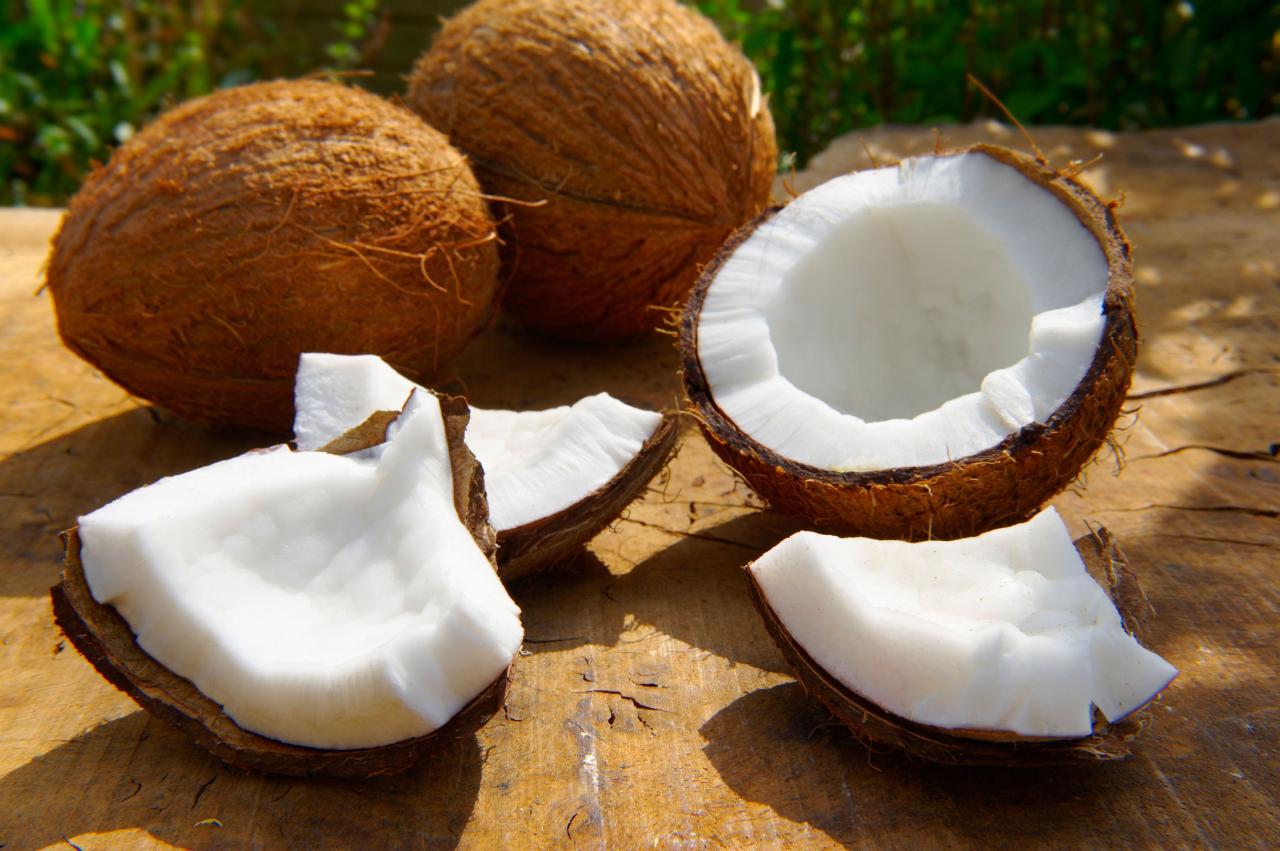
Coconut, beyond its culinary uses, has been recognized for its beauty benefits. Its oil, extracted from the coconut meat, is rich in fatty acids and antioxidants, making it a popular ingredient in various skincare and hair care products.
Coconut Oil for Skin Hydration and Moisture
Coconut oil’s moisturizing properties stem from its high lauric acid content, which easily penetrates the skin, providing deep hydration and moisture. This makes it particularly beneficial for dry and sensitive skin.
- Coconut oil forms a protective barrier on the skin, preventing moisture loss and keeping it supple and soft.
- It is a natural emollient, softening and smoothing rough patches, and can be used as a body moisturizer after showering or bathing.
- For those with dry skin conditions like eczema, coconut oil can provide relief from itching and inflammation, improving the skin’s overall appearance and comfort.
Coconut Oil for Hair Growth and Reducing Breakage
Coconut oil is widely used in hair care routines due to its ability to strengthen hair strands, promote growth, and reduce breakage.
- Its unique molecular structure allows it to penetrate the hair shaft, providing deep nourishment and conditioning.
- Regular use of coconut oil can help reduce frizz, improve shine, and make hair more manageable.
- It also acts as a natural sealant, locking in moisture and preventing damage caused by heat styling and environmental factors.
Coconut for Treating Skin Conditions Like Eczema
Coconut oil’s anti-inflammatory and antimicrobial properties make it a potential aid in managing skin conditions like eczema.
- It can soothe irritated skin, reduce itching, and promote healing.
- Some studies suggest that coconut oil can be as effective as some prescription medications in treating eczema, although further research is needed.
- Applying coconut oil to affected areas can help restore the skin’s natural barrier, preventing further irritation and dryness.
Incorporating Coconut into Beauty Routines
Coconut oil can be incorporated into various beauty routines for skin and hair.
- As a moisturizer:Apply a small amount of coconut oil to your face and body after showering or bathing.
- As a hair mask:Massage coconut oil into your scalp and hair, leave it on for 30 minutes, then wash it out with shampoo.
- As a makeup remover:Use coconut oil to gently remove makeup without irritating the skin.
- As a lip balm:Apply a thin layer of coconut oil to your lips for hydration and protection.
Coconut in Traditional Medicine
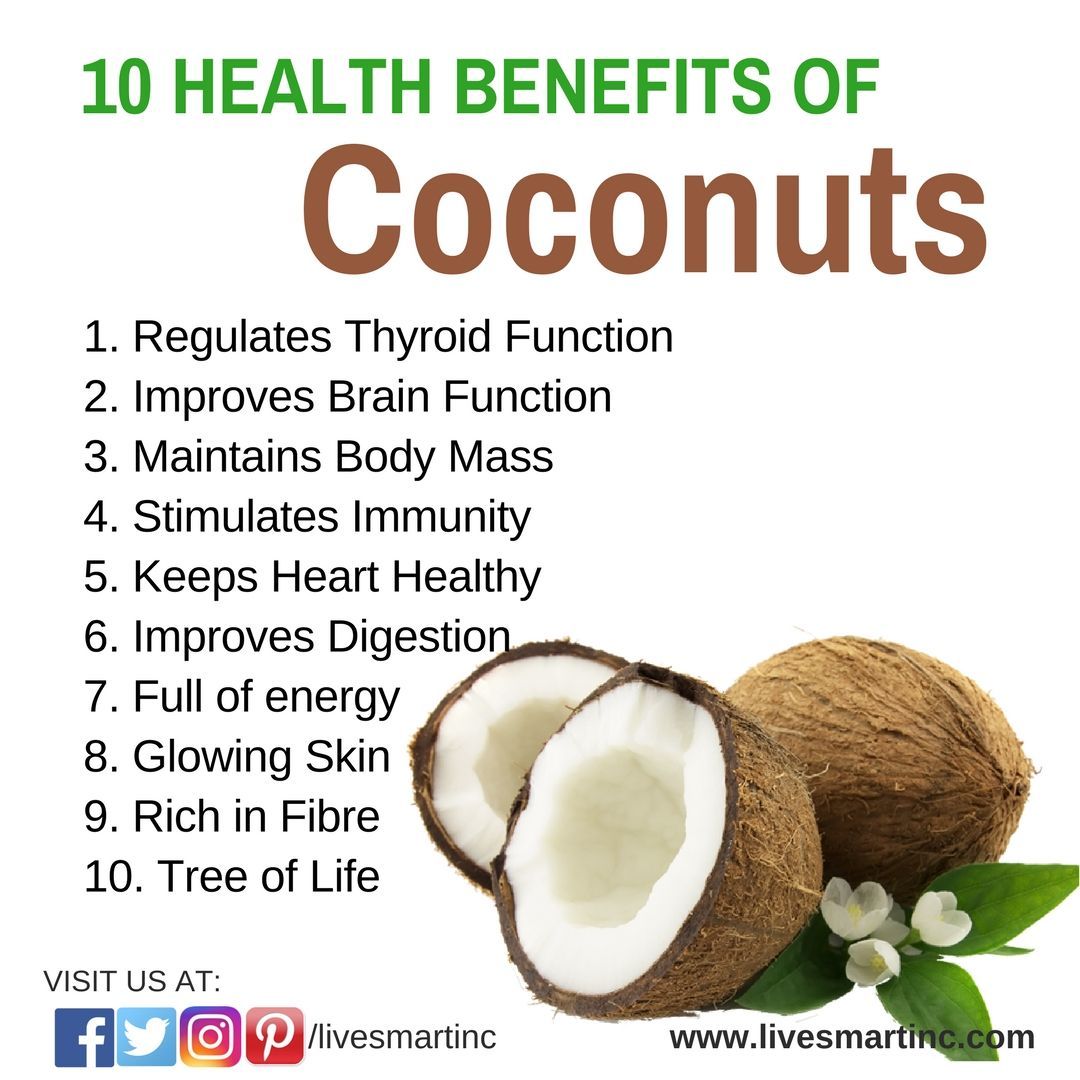
Coconut has been a staple in traditional medicine practices across the globe for centuries, with its versatile applications ranging from digestive health to skin and hair care. This section delves into the historical and cultural significance of coconut in various medicinal systems, exploring its potential benefits and traditional uses.
Coconut for Digestive Health
Coconut is often incorporated into traditional remedies for digestive issues due to its high fiber content and potential anti-inflammatory properties. Coconut oil, in particular, is believed to aid digestion by stimulating the production of digestive enzymes and reducing inflammation in the gut.
- In Ayurveda, a traditional Indian system of medicine, coconut oil is used to treat various digestive disorders, including constipation, diarrhea, and indigestion.
- In traditional Chinese medicine, coconut is considered to be a cooling and soothing food that can help to regulate digestion and reduce bloating.
- Coconut water, a natural electrolyte-rich beverage, is often consumed to rehydrate and replenish the body after bouts of diarrhea or vomiting.
Coconut for Boosting Immunity
Coconut’s rich nutritional profile, including its high content of lauric acid, is believed to play a role in strengthening the immune system. Lauric acid is a type of saturated fatty acid that converts into monolaurin, a compound known for its antimicrobial properties.
- In traditional Filipino medicine, coconut oil is used to treat infections and wounds, leveraging its antimicrobial and antifungal properties.
- Coconut water, rich in antioxidants, is often consumed to boost the immune system and combat oxidative stress.
- Coconut milk, with its high concentration of vitamins and minerals, is considered a nourishing food that can support immune function.
Coconut’s Antimicrobial and Antifungal Properties
The antimicrobial and antifungal properties of coconut, primarily attributed to lauric acid and other compounds, have been recognized in traditional medicine systems for centuries. Coconut oil and its derivatives have been used to treat various infections and skin conditions.
“Coconut oil is traditionally used in many cultures for its antimicrobial and antifungal properties. It is believed to be effective against a wide range of bacteria, fungi, and viruses.”
- In the Caribbean, coconut oil is traditionally used to treat fungal infections like athlete’s foot and ringworm.
- In Polynesia, coconut oil is applied to wounds and burns to promote healing and prevent infection.
- In traditional African medicine, coconut oil is used as a natural antiseptic and disinfectant for treating skin infections and wounds.
Illustrative Examples of Traditional Coconut Remedies
- Coconut oil for ear infections:In some traditional practices, warm coconut oil is instilled into the ear to treat ear infections. The oil is believed to have antimicrobial properties that can help to combat the infection.
- Coconut water for dehydration:Coconut water, with its high electrolyte content, is traditionally used to rehydrate the body during illness or after strenuous activity. Its natural electrolytes help to replenish fluids lost through sweating or vomiting.
- Coconut milk for skin conditions:Coconut milk, rich in vitamins and minerals, is traditionally used to soothe and nourish the skin. It is applied topically to treat skin conditions like eczema and psoriasis.
Ending Remarks: Can Coconut Be Healthy
Coconut, with its unique nutritional profile and versatility, offers a range of potential health benefits. Whether you’re seeking a natural source of electrolytes, a healthy fat for cooking, or a boost for your skin and hair, coconut can be a valuable addition to your diet.
However, it’s important to be mindful of potential risks associated with excessive consumption, especially for individuals with certain health conditions. By understanding the pros and cons of incorporating coconut into your lifestyle, you can make informed choices that align with your health goals.


